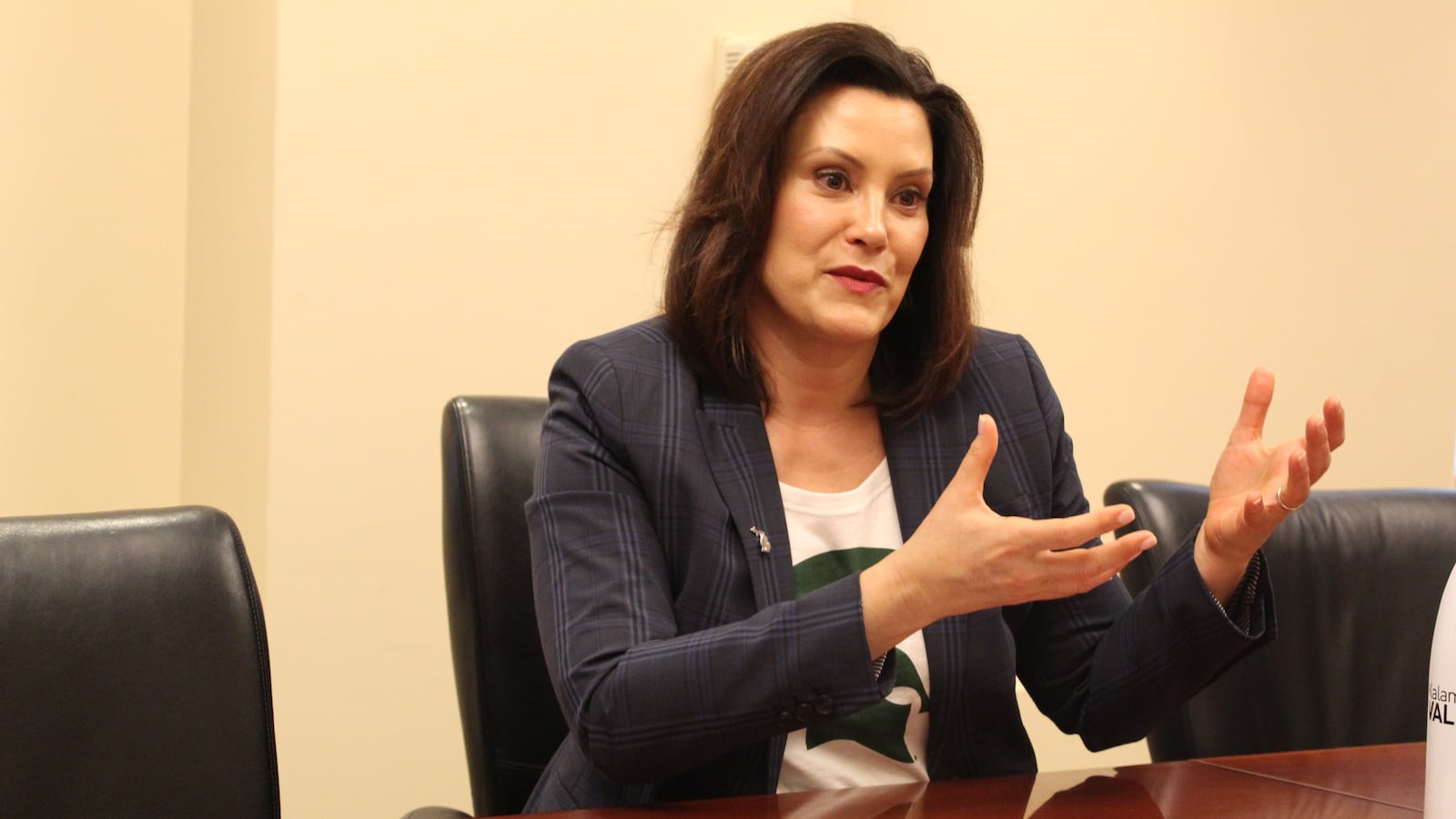Gov. Gretchen Whitmer wants to see every 4-year-old in Michigan have access to free preschool by the end of her first term in 2022.
It’s an “aggressive” goal, she said, and the most concrete timeline she’s laid out to date after promising on the campaign trail to greatly expand educational opportunities in the critical years before kindergarten.
“We’ve gotta get serious about this,” Whitmer told reporters from Chalkbeat Detroit during an exclusive interview in her Lansing office on Friday. “I think that we absolutely have to have a concrete goal when it comes to universal pre-k.”
In a 30-minute interview, Whitmer addressed a range of education issues facing the state including school funding, charter school oversight, and the tough third-grade reading law that next year will start requiring schools to hold back third-graders who are reading below grade level. (We will publish additional takeaways from the interview, as well as a full transcript, next week.)
A dramatic expansion of pre-K for 4-year-olds would be a major shift in Michigan’s education landscape, one that experts insist would help reverse decades of backsliding academic performance.
Whitmer’s comments on preschool came in response to a question about whether she had concrete targets to deliver on her campaign promise of bringing universal pre-kindergarten to Michigan schools. Whitmer, in her State of the State address, vowed to ensure that 60 percent of adults completed some form of higher education by 2030, but that speech did not mention early childhood education.
That doesn’t mean it’s not a priority, she said Friday. But expanding preschool to all 4-year-olds is made more complicated by a statewide lack of qualified preschool educators, she said.
“If we went to 100 percent today we wouldn’t have the expertise in the classroom to serve the children,” she said.
That’s not the only wrinkle in the plan: The Republican-controlled legislature vehemently opposes the gas tax that is a key piece of Whitmer’s proposed budget. She wants the tax to help pay for an $85 million increase in funding for the Great Start Readiness Program, Michigan’s highly regarded preschool program for 4-year-olds, a boost that she called a “first step” towards universal pre-K.
If that first step falters, does she have a plan B?
“Nope,” she said. “I’m confident in my budget, and I feel that any alternative probably won’t address all the issues that mine does. But if someone has one that does, I’m open to having that conversation.”
Whitmer’s proposal to dedicate more money to preschool programs this year is aimed partly at raising teacher salaries. Pay is currently so low that some pre-K programs say they are losing teachers to cash-strapped K-12 districts.
The lack of teachers “has been a challenge,” said Matt Gillard, president of Michigan’s Children, an advocacy group. “When we expanded our Great Start Readiness Program under Gov. Snyder it was a challenge.”
Under Whitmer’s plan, regular increases in funding over four years would help draw more people into the field, making it possible to jump from the 36 percent of 4-year-olds currently enrolled in government-funded pre-K to 100 percent by the time her first term is out.
Still, Denise Smith, executive director of the Flint Early Promise Collaborative, said that expanding access for 4-year-olds is just one of the steps Whitmer could take to strengthen early childhood education in Michigan. For starters, the regulations attached to the statewide pre-K program are often incompatible with Head Start, a federal program that includes preschool for 4-year-olds, she said. That makes it difficult for many programs to access all the available government funds that should be available to them, she said.
“There are things that can be done within the current framework” to improve access to early childhood education, Smith said. “It would require the state to be more flexible.”
Some argue that Michigan should simply be doing more as advocates increasingly turn their attention to children who are even younger. Michigan recently expanded its program for 4-year-olds, and its options for younger children are significantly less robust.
“Learning begins at birth,” Gillard said. “A universal program for 4-year-olds is great, but what happens between birth and age 4 is critically important. There are huge gaps and huge discrepancies in the experiences that people have, based on demographics and their surroundings.”
Whitmer’s proposed budget also would expand childcare subsidies to more families. She wants to pay for the increases using federal Child Care Development Block Grants.
Mayor Duggan had wanted to use that money for a universal pre-K program in Detroit, but Whitmer said Friday that there was less money available than he initially believed. Still, she said she supports the idea of a free pre-K program in Detroit, and she said she’d be willing to talk with Duggan about other paths forward.
Universal pre-K in Detroit “adds to some of the momentum that’s happening in the city and gives people confidence about opportunities for kids the city,” Whitmer said. “I think it would be incredibly helpful.”

